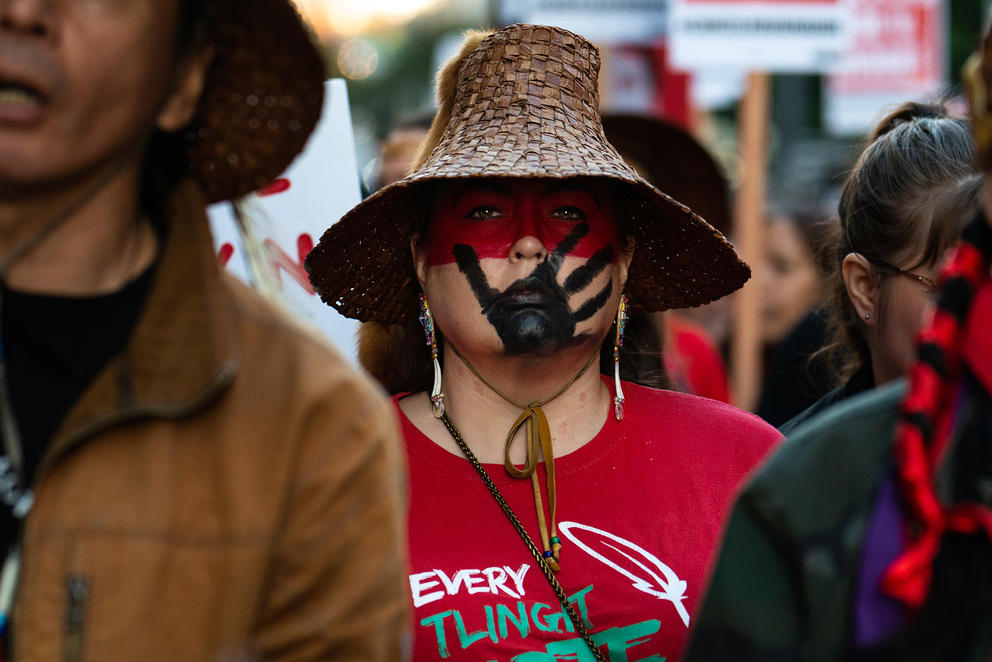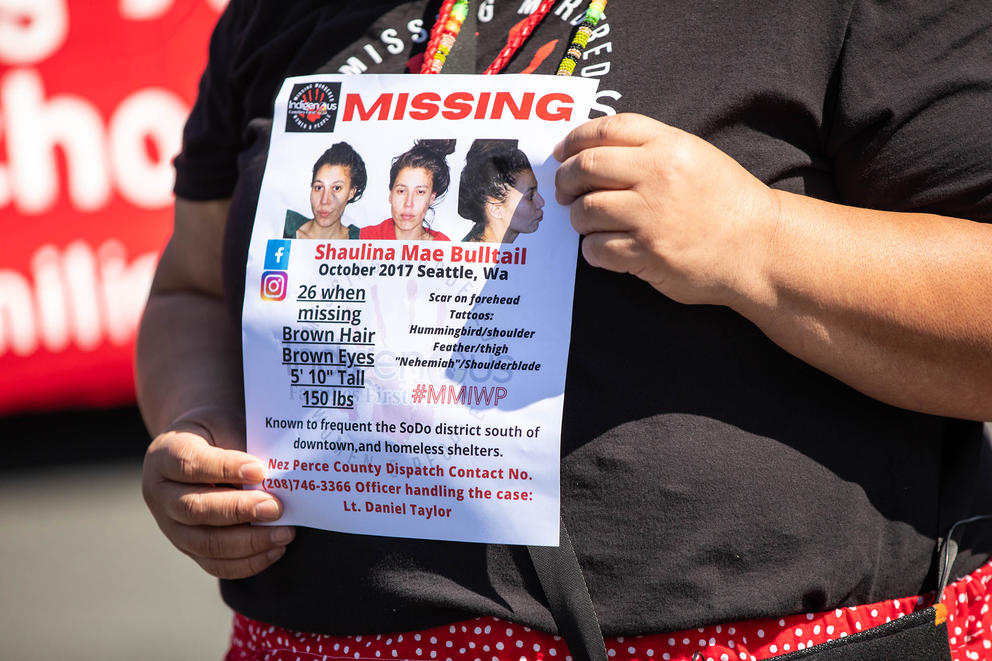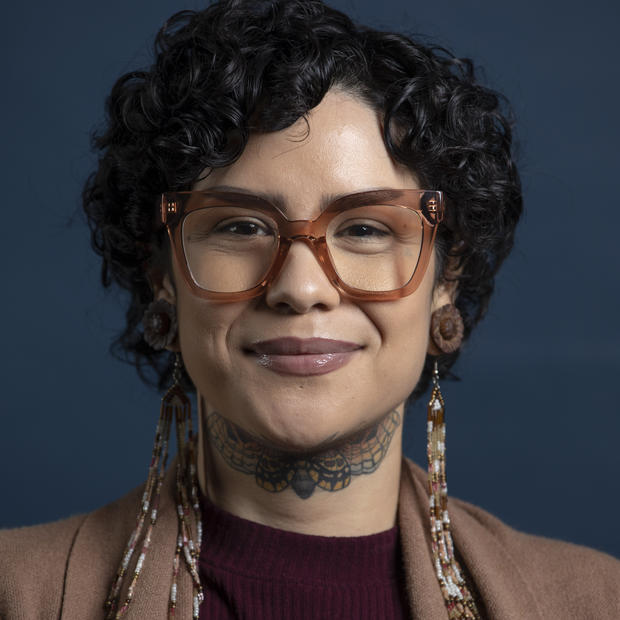The Washington State Association of Sheriffs and Police Chiefs, a union for executive and top-management law enforcement, argued that the bill’s original language could jeopardize the cold-case investigations. “We cannot tolerate insertion into criminal investigations that could do more harm than good,” James McMahan, policy director for the WASPC, said during a Jan. 17 meeting of the House Committee on Community Safety, Justice, & Reentry. The bill is scheduled for a committee vote on Thursday.
Opportunity for healing
According to data collected by the Attorney General's Office, there are 2,200 unsolved homicides in Washington. Native American women make up nearly 5% of those, though they represent less than 2% of the state's population. That’s 110 Native women.
“I've watched families speak bravely and powerfully about the ways that unresolved and incomplete investigations have impacted their ability to grieve a loved one who has been murdered,” Annie Forsman-Adams, policy analyst for the attorney general's task force and citizen of the Suquamish Tribe, said during the Jan. 17 hearing. “We cannot make a family whole again and we cannot bring someone back that was taken from us unjustly. But we have a real opportunity here to change the outcomes for future generations following a long legacy of unchecked violence, broken promises, and the denial of justice. There's an opportunity to move forward on another path.”
Rep. Lekanoff believes that this legislation and this cold-case unit will allow Washington to lead the nation. “I think it sends a really strong message to our Washington constituents, the first people of Washington state or Native Americans, that those 110 lives matter,” Rep. Lekanoff said during the hearing.
The Missing and Murdered Indigenous Women and People Task Force consists of representatives of Washington’s federally recognized tribes, urban Native organizations, local government, Indigenous community members who have lost loved ones or been otherwise impacted by the epidemic of missing and murdered women and people, and local law enforcement who support this legislation.
A law enforcement subcommittee within the task force, led by Sam White, Chief of Police of the Lower Elwha Klallam Police Department, voted unanimously with the rest of the group to establish a permanent cold-case unit within the Attorney General’s Office. James Fincher, vice president of the Washington State Fraternal Order of Police, a union for law enforcement officers, was also at the Jan. 17 committee meeting representing the union’s 4,000 members in support of the legislation.
If the legislation passes, a MMIWP cold-case unit would be fully funded under the existing Homicide Investigation Tracking System program within the Attorney General's Office, which tracks and investigates homicides and rapes. Cold cases vary in scope, but may include unsolved homicides, sexual offenses, sexually motivated offenses, missing persons and cases of unidentified remains, according to court documents.
In addition to the training most of these investigators have as experienced homicide or major-crimes detectives, members of the new unit would receive additional specialized training emphasizing cultural competency and working with tribal nations, if the bill passes.
According to the Attorney General’s website, these investigators are often called upon to review cases and provide a new perspective on investigations for local law enforcement. The Washington State Association of Sheriffs and Police Chiefs is concerned about what they consider a “civilian unit” getting involved in their cases. The investigators in the Attorney General’s Office are no longer commissioned law enforcement. However, they were in the past and remain highly trained, experienced professionals
Finding common ground
The sheriffs and police chiefs also expressed concerns that these investigators would insert themselves into cases of interest. The bill, as originally proposed, says they can become involved only at the request of the primary investigating agency, not jump into cases wherever they want without first going through a collaborative process.
“We can proactively offer assistance, but it has to be a collaborative relationship between the investigating law enforcement agency and our office,” Forsman-Adams said. “There wouldn't be any way for the new cold-case unit to insert themselves in active cases. This bill in no way changes our authority. What this bill does is it expands the infrastructure of our existing HITS team to be able to devote resources specifically to MMIWP cold cases.”
Most law enforcement agencies in Washington do not have dedicated cold-case units, and the task force believes they can benefit from assistance.
“We want to make sure that the smaller jurisdictions have access to trained, experienced investigators who can make sure that the cases are getting a robust investigation,” Forsman-Adams said.
The sheriffs and police chiefs pushed for stronger language in a substitute bill, which was introduced at the Jan. 26 committee meeting, to require not only a formal referral from a prosecutor, which is the current standard, but also an additional request from the agency with jurisdiction over the case before the new cold-case unit can assist with an investigation. They also moved for the unit to be referred to as the missing murdered Indigenous women and persons cold-case assistance unit, versus just being designated as a cold-case investigation unit.
The Attorney General’s Office worked with the sheriffs and police chiefs to find common ground on the new language that maintained the task force’s original recommendations, and will push forward.
“We spent a significant amount of time talking to family members and talking to community members, and they had some specific asks that we included in the recommendation and then used that recommendation language to write the bill,” said Forsman-Adams. “The bill as written really captures the nature of what is responsive to the community. We want the unit to be able to work with family members who are experiencing trouble navigating the system.”
Advocating for the families is critical to the new cold-case unit, which would fund investigators as well as a case navigator, who would act as a family advocate and liaison between the families and the Attorney General’s homicide investigator in a trauma-informed, culturally responsive way, according to Forsman-Adams.
Members present for the vote on the substitute bill unanimously voted favorably and approved the bill to move forward onto the House floor.




